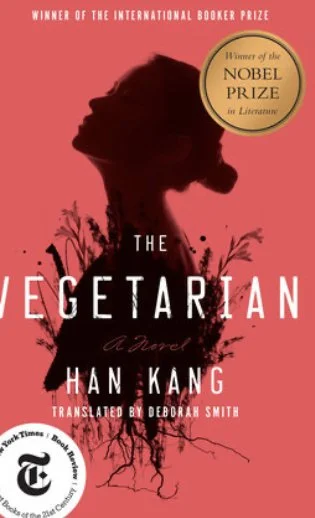The Vegetarian by Han Kang, translated by Deborah Smith (Hogarth Press)~Janet Brown
When Yeong-hye’s husband finds her standing transfixed in front of their open refrigerator during the middle of the night, she tells him only “I had a dream.” Since he chose her as his wife simply because she is unremarkable in every way, he gives this moment very little thought. Then he comes home from work to find her removing every bit of meat in the refrigerator and throwing it into garbage bags. The waste infuriates him, especially when he discovers the kitchen contains no eggs or milk, in addition to meat, and never will again. Yeong-hye, formerly a compliant wife who grew up a carnivore, has become a vegetarian who prepares only plant-based meals and turns away from her husband’s touch because he reeks of meat. When she embarrasses him at a company dinner, he enlists the help of her parents in bringing her back to reason.
Now emaciated, Yeong-hye refuses all of her favorite dishes at a family dinner and a brutal scene with her father results in her attempt at suicide. Hospitalization does nothing to change her new eating habits and her quiet obstinacy leads to domestic upheavals. Her husband leaves her, her brother-in-law uses her in a shocking art project that destroys his marriage, and her sister finds her own life seems confining as Yeong-hye clings to the existence she has chosen on her own terms.
The novel is told from the points of view as seen by these three people. Just a few internal moments reveal what Yeong-hye has on her mind and these revelations are savage and enigmatic. Otherwise readers see only the obedient wife who inexplicably changes, the sister-in-law who becomes a passive sexual instrument with her body covered in painted flowers, the insane younger sibling whose older sister struggles with guilt because she failed to rescue Yeong-hye from a childhood of brutal physical abuse.
The Vegetarian veers from being disgusting and horrifying into scenes that are profoundly sad and astonishingly beautiful. Han Kang was haunted for years by a statement from another Korean writer, Yi Sang, who said “I believe that humans should be plants.” Pondering “questions about human violence and the (im)possibility of innocence,” she wrote a short story about a woman who became a plant. Then she created Yeong-hye.
Winner of the Nobel Prize for literature, Kang is an author who never writes the same book twice. We Do Not Part (Asia by the Book, October 2024), The White Book (Asia by the Book, July 2025), Greek Lessons (Asia by the Book, August 2025) all fearlessly explore different facets of the human condition but each in ways that deviate from the others, similar only in her use of different voices to propel her narratives and her underpinning of modern Korean history. Her novels are emotionally difficult, told in unflinching yet poetic language. After encountering and finishing one of them, the other books all insist on being read, perhaps not in rapid succession but beckoning with an inexorable allure. Han Kang’s work becomes a benign addiction, one that’s fed by her prolific talent and her sharp dissection of what it is to be human in this period of history.
